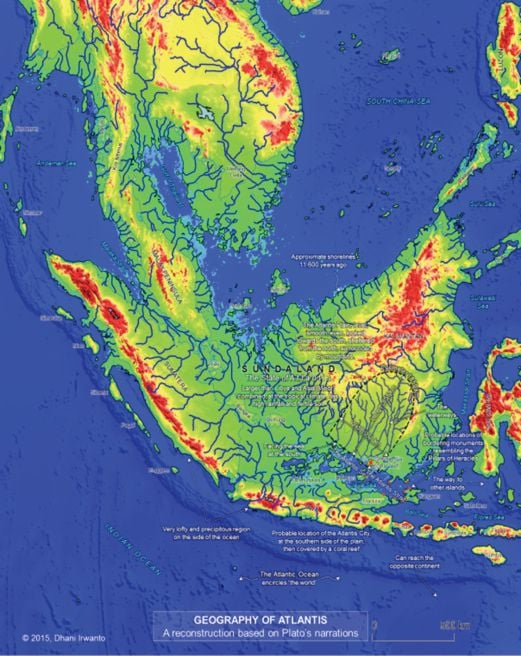My heart pours out for folk in Aceh, who are struck by the recent earthquake. It is so devastating. I recall what happened on Boxing Day in 2004, when Aceh was shaken by tsunami, killing more than 160,000 people.
Many believe that a large volcanic eruption sunk Atlantis. It is more plausible to believe that Atlantis went underwater during the Ice Age when the sea level rose more than 150m.
While the exact location of Atlantis is still being disputed, some believe it is in the Java Sea. If this is true, both places are within the Sunda Arc, which is prone to volcanic eruptions and tsunamis.
While Aceh was an important Islamic nation in the 16th century, some hold the view that the sunken Atlantis was the first site of human civilisation and home to the earliest Malay civilisation.
One of the local anthropologists who studied the linguistic features of early human migration in the Malay world is Emeritus Professor Wan Hashim Wan Teh, currently with the National Defence University of Malaysia.
He has published articles on the origin of Malays and their diaspora. His latest article appears in the book Asal Usul Melayu, Induknya di Benua Sunda (The Origin of Malays, Home in Sundaland), which he co-edits with two others. The book was published this year. Wan Hashim has long dismissed conventional views that Malays originated from Yunnan and Taiwan.
The story of Atlantis remains one of the world’s most unsolved geo-mythologies. Since Plato first mentioned Atlantis nearly 2,400 years ago, it has been the subject of fascination and curiosity among geologists, archaeologists, explorers and historians.
Plato describes Atlantis as a “powerful and advanced kingdom that sank, in a night and a day, into the ocean around 9,600 BC”.
The search for this submerged civilisation has resulted in expeditions to “many sites”, including the Greek island of Santorini, which was destroyed by a large volcanic eruption around 1,600 BC.
Expeditions to locate Atlantis were undertaken off Morocco, Spain, Portugal, Crete and Cuba, and some thought Atlantis is beneath the Antarctica.
In 1679, a Swedish scientist published a four-volume work proving that Sweden was the original site of the missing Atlantis. Few outside Sweden found his thesis convincing. None of these sites match the geographical descriptions Plato mentioned in his discourses.
A number of scholars working separately believe the mystery has been resolved.
Professor Arysio Santos, from Brazil, in his book Atlantis: The Lost Continent Finally Found, provided “evidence” that the Atlantis was part of the Sundaland.
His findings have inspired scientists like Dhani Iriwanto and Dr Danny Natawidjaya to dig deeper.
The former has published an interesting book — Atlantis: The Lost City Is in Java Sea (2015) — that says it all.
Natawidjaya captured my interest with a book that carries an interesting title: Plato Never Lied: Atlantis Is in Indonesia (2015).
In 1998, a reputed genetics expert at Oxford University published a monumental work, Eden in the East. In this book, Professor Stephen Oppenheimer suggests that the drowned continent of the Atlantis is probably in Southeast Asia.
His “discovery” has rekindled interest in other researchers, who believe that Plato’s “powerful kingdom and its civilisation” that went “underwater in a day and one night”, during the glacial age is actually the submerged Atlantis.
By studying the DNA of the descendants of the early migrants from Africa some 60,000 to 70,000 years ago, Oppenheimer was able to establish that the Malays of today’s Nusantara were originally from Africa. They were the first to occupy Sundaland, which included the sunken Atlantis.
According to Oppenheimer, there is a strong possibility that “the final dramatic rise in water level occurred between 8,000 and 7,000 years ago, the last of the series of emigration from the sinking Sunda Shelf began. The migration routes went south towards Australia, east towards the Pacific, west into the Indian Ocean and north into the Asian mainland”.
Oppenheimer has further suggested that the ancestors of “these people, and their Austro-Asiatic speaking neighbours now on the Asian mainland, founded the complex societies in Southeast Asia... in their dispersals the Southeast explorers fertilised the Neolithic cultures of China, India, Mesopotamia, Egypt and Crete”.
B.A. Hamzah is a student of regional geopolitics and defence policy, and a commentator on maritime security
Copy and paste: New Straits Times
30.9.2018: 8.37am




No comments:
Post a Comment